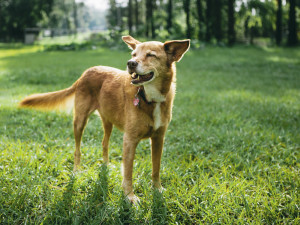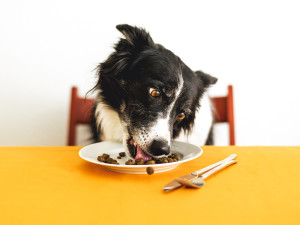When a Cough Isn’t Just a Cough
Seven reasons to be concerned when your dog is coughing, according to veterinarians

share article
When you get a tickle in your throat, you probably have a go-to list of things you can chalk it up to: seasonal allergies, dehydration, maybe even a wild night that’s morphed into a head cold. But when your dog is coughing, it’s far more mysterious.
If you feel a gut-level concern over it, it’s justified. “A little cough here and there is not a big deal, but if they’re coughing multiple times a day, that’s a problem,” says Dr Ashley Rossman, DVM, a veterinarian at Glen Oak Dog and Cat Hospitalopens in a new tab. “It’s not a normal thing that a dog just does.”
From phlegm and mucus to a swollen belly, below you’ll find the symptoms to watch out for. Here are the six most common medical reasons why your dog could be coughing.
1. Respiratory infections (kennel cough)
“Some dogs will cough after routine things, like drinking water or eating treats too quickly,” says Dr Sara Ochoa, a veterinarian at Whitehouse Veterinary Hospitalopens in a new tab. But if you can’t attribute your dog’s cough to an activity, they’re coughing more than once or twice a day, or they’re “coughing up yellow or greenish mucus or blood, you need to see a vet soon”.
Like humans, pets can catch respiratory infections pretty easily, especially if they’re playing with other pets at parks, daycare or other crowded areas. They are spread through respiratory droplets that are kind of hard to avoid when wrestling and sharing toys or water bowls. If you work with dogs, you could even carry a virus or bacteria home on your clothes.
If your dog is coughing up phlegm, that’s a common symptom of a respiratory infection. Respiratory infections are particularly typical among kennelled pets, it’s how ‘kennel cough’ was coined. It can actually comprise a mixed bag of viruses or bacteria, including the Bordetella bacteria, adenovirus type-2, parainfluenza, and even canine coronavirus – don’t freak out, it doesn’t affect dogs like us. Kennel cough affects a dog’s windpipe and bronchial tubes, leading to a hacking, honking or retching cough that may sound as though they’re choking or trying to cough something up. You’ll know it when you hear it.
The Bordetella bacteria can also lay dormant in a dog until conditions are ripe, with symptoms suddenly appearing after exposure to smoke, travel-induced stress or cold temperatures. If your vet says that your pup is at risk of these infections, whether due to location, environment or lifestyle, they may recommend vaccination. The Bordetella vaccine can help prevent most strains of kennel cough if your pet hangs out with other dogs regularly, but it’s only good for six months so you need to keep getting booster shots. While the infection is highly contagious, thankfully it can be treated with antibiotics. But if left untreated, it can morph into pneumonia.
2. Pneumonia
A dog coughing up mucus could also be a sign of pneumonia. Dogs with compromised immune systems are more at risk of a respiratory infection snowballing into pneumonia, but we don’t recommend the ‘wait and see’ approach if your dog is showing signs. By the time a dog’s cough is accompanied by fever, fatigue, loss of appetite, green or bloody mucus from their nose; or when they’re hyperventilating or having difficulty breathing, they’ll probably need to be hospitalised because their lungs are full of fluid or pus. See a vet at the first signs of an infection.
Pneumonia isn’t always caused by Bordetella. It’s technically an inflammation of the lungs, which can be triggered by inhaled irritants like smoke and aerosol sprays, trauma from a chest injury or other bacteria and viruses including canine flu. And it takes a lot more to treat pneumonia than antibiotics: we’re talking steroids, bronchodilators, nebulisers, feeding tubes, supplemental oxygen… you get the picture.
3. Allergies
All that pollen in the air? It gets to your dog, too. Allergies are the most common medical concern in dogs, though most will struggle with itching and scratching more than upper respiratory symptoms. Still, allergens can sometimes affect your pet’s airways and lead to coughing, sneezing, wheezing, panting and discharge from their eyes and nose.
There’s not much you can do to prevent respiratory reactions to allergens, but you can treat them with antihistamines like Benadryl and, in serious cases, corticosteroids. But don’t ignore them, as that can lead to bronchitis and sinusitis.
4. Heartworm
Although a cough might immediately make you zero-in on the lungs or throat, it can also be a warning flag from another part of the body – the heart. Heartworm disease is exactly what it sounds like: worms infest a dog’s heart and lungs, blocking their arteries, and damaging the organs in the process. Heartworms spread via mosquito bite, where tiny larvae are transferred to the dog’s bloodstream and eventually grow into adult worms within their heart, releasing even more larvae. Thankfully, heartworm is very rare in the UK as the parasite needs high temperatures to develop in the mosquito. However, if your dog is travelling with you to more Mediterranean temperatures you should seek out vaccination.
Dogs can be treated for heartworm, but it isn’t pleasant. “You basically have to inject them with poison to kill the worms, so it’s really nasty,” says Dr Rossman. The aggressive protocol has side effects, but not treating heartworm is not an option because it can be fatal. She also recommends that every dog take preventative medication for heartworms, either in the form of a monthly chewable like Heartgard or a vaccine. Giving your dog a preventative treat once a month when necessary is doable on the scale of things.
5. Congestive heart failure
Unfortunately, not all heart problems are preventable. Genetic heart defects can get worse as a dog ages, leading to congestive heart failure. Classic signs for congestive heart failure (in addition to coughing) include tiring easily, restlessly pacing and rapid breathing – especially after exercise or in the evening. Subtler, but more advanced symptoms would be fainting, weight loss, a swollen belly and a change in your dog’s tongue or gum colour owing to poor oxygen flow.
Depending on your dog’s heart condition (and grade if it’s a heart murmur), your vet may prescribe medication that can correct irregular heartbeats, slow fluid build-up in the lungs or help increase blood flow (don’t be confused if they prescribe Viagra). Some dogs are candidates for surgery to install a pacemaker or correct valve dysfunctions. In general, curbing your dog’s activity levels can ease the strain on their heart.
6. Tracheal collapse
The symptoms of tracheal collapse closely resemble those of kennel cough, but add vomiting, gagging and non-productive coughs (no phlegm) to the list. Dr Ochoa notes it’s a common reason for coughs in small dogs such as Pomeranians, Yorkies, Toy Poodles, Chihuahuas and Pugs. “They will have a classic goose-honk cough,” episodes of which can sound pretty intense and typically follow exercise, excitement or excessively high temperatures.
“Depending on the severity, there are many different ways it can be treated,” says Dr Ochoa. “For mild cases, most dogs just take cough medication when they need it. In very severe cases, dogs will need surgery – usually a stent is placed in or around the trachea to keep it from collapsing.”
7. Cancer
Not to sound like a WebMD article where all roads lead back to cancer, but coughing can be a sign of lung canceropens in a new tab in dogs. The good news is it’s quite rare, though certain breeds seem to be more prone to it than others, including Boxers, Doberman Pinschers, Australian Shepherds, Irish Setters and Bernese Mountain Dogs.
As is the case with people, lung cancer in animals has been linked to the inhalation of cigarette smoke. But about one third of dogs are not symptomatic and tumours are often discovered incidentally by chest X-rays (then confirmed via biopsy). Depending on the diagnosis, a veterinary oncologist may recommend surgery, radiation and/or chemotherapy.
This information is not meant to be a substitute for veterinary care. Always follow the instructions provided by your veterinarian.

Colleen Stinchcombe
Colleen Stinchcombe lives near Seattle, WA, where she works as a writer, editor, and content strategist. Her two rescue pups wish she were a professional ball-thrower.
Related articles
![A woman and a dog laying close together on a couch.]() opens in a new tab
opens in a new tabPaging Dr Doggo
Your pup may know you’re sick before you do
![Brown Dachshund dog wearing a gray and white striped handkerchief and laying on blankets]() opens in a new tab
opens in a new tabStaying On Top of Canine Melanoma
Dog melanoma can develop in many places on a dog’s body. Here’s everything you need to know about what causes melanoma and its symptoms
![Border Collie digging into a plate of dog food while seated at a yellow table]() opens in a new tab
opens in a new tabHow You Can Easily Manage Your Dog’s Weight
Keep your pup’s weight down, and you could add years to their life. What’s better than that?
- opens in a new tab
Why Do Dogs Sneeze?
And what can I (or should I) do when my dog keeps sneezing?







